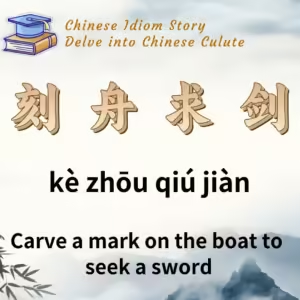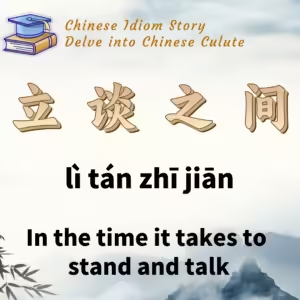
Chinese Idiom: 刻舟求剑 (Ke Zhou Qiu Jian)
English Translation: Carve a mark on the boat to seek a sword
pīn yīn: kè zhōu qiú jiàn
Idiom Meaning: This idiom metaphorically describes someone whose subjective understanding fails to keep pace with or adapt to the constantly changing objective situation. It signifies rigidity and stubbornness in thought, as well as a lack of awareness of changing circumstances.
Historical Source: Lüshi Chunqiu (《吕氏春秋·察今》).
Idiom Story:
In ancient Chu, there was a man who, while crossing a river on a boat, accidentally dropped his treasured sword into the water. In a panic, he marked the spot on the side of the boat where the sword fell, reassuring himself, “I must remember, my sword fell in this exact spot.”
His companions were puzzled by his actions and asked him, “What is the point of that mark?” He replied confidently, “Of course, I will find my sword where it fell!”
Once the boat reached the shore, he jumped into the water at the marked spot, desperately searching for his sword. However, this endeavor was futile. The man failed to understand a simple truth: after the sword fell into the water, the boat had continued to move, while the sword remained submerged at the riverbed.
Thus, attempting to retrieve the sword from the same location marked on the moving boat was absurd. The story highlights the folly of inflexibility and the inability to adapt to changing conditions, leading to wasted effort and disappointment.
This idiom serves as a caution against being rigid in one’s thinking and encourages a more adaptive and responsive approach to life’s challenges.






